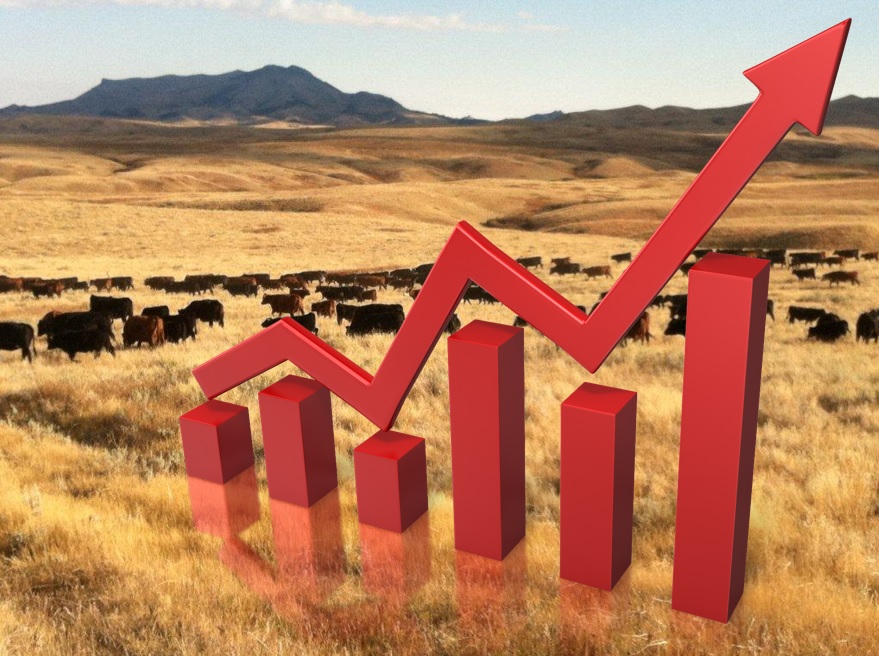Ever wonder why one patch of dirt can be worth a fortune, while another seemingly identical piece goes for pennies? It’s all about the market value of land.
In this labyrinth called real estate, market value of land plays the lead role. It’s an elusive beast, influenced by numerous factors like location and zoning laws.
I remember standing on my first potential investment – a sun-drenched acre in Texas. The aroma of earth mixed with anticipation. I could see possibilities; but how much was it truly worth?
You may find yourself in similar shoes, pondering what drives the market value of land.
This post will unravel that mystery – we’ll delve into defining market values, discuss factors affecting them and even share some tips for your next big land purchase!

Understanding Market Value of Land
The market value of land, a key term in real estate circles, can be puzzling. It’s like the cost of your beloved kicks at the shop – what a person is ready to fork out for them.
Defining Market Value
A property’s current and fair market value of land is determined by various factors such as its location or potential use. Just like those fancy kicks that are pricier because they’re limited edition. The average cost per acre across America? That would be $3,000.
In 2023 alone, land sales grew by an impressive 6%, even outdoing commercial properties and industrial buildings. According to Realtors Land Institute, this trend isn’t slowing down any time soon.
The Role of Market Conditions
Moving on from our sneaker analogy (we’ll miss you), imagine instead a marketplace where multiple vendors sell similar items. If one vendor offers a product with more features or benefits than others at the same price point—that’s going to have higher demand right?
This applies similarly in real estate—various conditions can boost a property’s fair market value significantly. For instance: A beachfront lot will likely command more money compared to inland plots due to desirability factor—the ocean view just adds up some extra zeroes.
Now if we think about ranches under James Bigley Ranches—a historical haven for cowboy enthusiasts—the concept still holds true but there are additional nuances tied into it.
To wrap up this section related to the market value of land (we know, it’s a lot to take in), understanding the market value of land isn’t just about knowing prices. It involves an awareness of trends, potential uses for different types of properties and being savvy about various market conditions that can sway property values.
So next time you’re browsing through real estate listings or walking across a piece of open land on one fine sunny day—think about its ‘market value’. Remember our sneaker analogy (oh yes, we brought them back) and think beyond the price tag.
Key Takeaway:
Land, much like your top-choice kicks, carries a market value – it’s all about what folks are ready to shell out. This ‘dollar amount’ hinges on numerous elements such as location and potential uses. In 2023, land sales stole the limelight from commercial and industrial properties by growing 6%. Market vibes can also boost property values; imagine ocean vistas or
Factors Influencing Land Value
The value of land isn’t just a random number. It’s determined by various factors, from zoning laws to its desirability as a location. To give you an idea, land prices in California, one of the most desirable locations in the US, average at $10,000 per acre. But why so high? Let’s break it down.
The Impact of Zoning Laws on Land Value
Zoning laws play a crucial role when we talk about land value. These laws dictate what can be built and where which directly impacts property type and hence its worth. A commercial zone typically has higher market values compared to agricultural or residential zones due to their potential for income generation.
For instance, if your plot falls within a flood zone, that could decrease your land’s price tag significantly because building there comes with risks and insurance costs – not everyone is ready for such an adventure.
Road access also matters here; after all who wants to buy something they cannot reach easily? Property tax rates affect affordability too – nobody likes nasty surprises come tax time.
Property Taxes & Tax Assessment
In many states like Mississippi where land averages around $1,000 per acre, lower property taxes make owning large pieces more affordable than other places with sky-high levies.
Apart from actual taxes owed each year though is how much tax assessment affects overall cost calculations since these are used for figuring out amounts due annually.
Leveraging Desirable Locations
“Location. Location. Location.” – ever heard this phrase before? In real estate circles it’s repeated ad nauseam because nothing drives up (or down) the price of a plot like where it’s located.
Desirable locations can mean anything from stunning views, proximity to amenities such as schools and hospitals or even being in an area with a booming land market.
For example, any land within commute range such as Austin Texas will be higher priced per acre than any land outside the commute range of a metroplex.
The logic is simple: As demand increases, so too does the cost of living in desirable locations. This principle explains why farmland values are expected to rise in certain areas by 2023 – everyone wants their piece of paradise.

Key Takeaway:
Land value isn’t random; it’s shaped by zoning laws, location appeal, and tax rates. Zoning rules influence the property’s potential use – commercial zones often command higher prices. Location matters too – high-demand areas fetch more bucks. Remember, property taxes can also impact affordability.
Approaches to Determining Land Value
Determining the market value of land is a crucial component in real estate, so what strategies are used to achieve an accurate appraisal? There are several approaches used by professionals, including the cost approach and income approach. Let’s dig deeper into these methodologies.
Sales Comparison Approach
This popular method uses comparable property sales to determine the market value. Real estate experts look at recent transactions involving similar properties within a given area. They consider factors like location, size, and improvements on the land before making their calculations.
But there’s more than just looking at what other lands have sold for. Adjustments need to be made based on unique characteristics or attributes that may increase or decrease a property’s assessed value compared with others. For more info go here.
Cost Approach
The cost approach estimates how much it would take to replace an existing structure from scratch—considering both material costs and labor fees—but what about vacant lands?
In this context, we calculate based on development potential: estimating construction expenses plus entrepreneur profit minus physical deterioration (if any) equals your land’s estimated worth using this method. Investopedia provides a detailed breakdown of this process.
Income Approach
If you’re considering buying commercial farmland or rental property where earnings can be expected over time—the income approach comes handy. This technique values your prospective piece according to its ability generate revenue. In simpler terms—it helps predict future profits.
A standard way is by calculating Net Operating Income divided by Capitalization Rate (go here for more info)—an effective tool when examining long-term investments. Corporate Finance Institute offers a comprehensive guide on this topic.
These approaches can be complex, but they’re critical for anyone in the real estate business. It’s always advisable to seek professional help when valuing land—remember, every dollar counts.
A Final Thought
Determining the worth of land is a combination of technique and knowledge. You need to know market trends, local rules, environmental stuff, and more. Every approach has its good points and bad ones.
.jpg)
Key Takeaway:
Assessing land value isn’t merely a numbers game—it’s a fusion of creativity and logic. It involves comparing similar property sales, calculating potential income or replacement costs, and using various methods to get the full view. But keep in mind: each piece of land is distinct. Make sure you account for those unique characteristics that could shift your land’s value. If unsure, don’t hesitate to seek advice from professionals.
Evaluating Potential Land Investments
Investing in land presents a unique set of opportunities and challenges. As real estate investors, you may have wondered how to transform raw land into a lucrative venture.
Generating Income from Land Investments
To start with, potential land investments can offer various avenues for generating income. Beyond buying and selling, there are additional ways to generate income from land investments.
One approach is leasing the property. Let’s take Texas as an example, which happens to be the most active land market in the USA. With an average of 100,000 acres sold each month, there’s plenty of opportunity for landlords looking to lease their lands for farming or hunting purposes. Income possibilities from a property include livestock production, crop production, leasing for hunting, renting dwellings, leasing for livestock, and even more.
Apart from this traditional method, savvy estate investors look towards renewable energy projects such as wind farms or solar fields that need large plots of undeveloped territory – your raw land could be perfect.
Hiring Professionals: The Need For Expertise
Making money off vacant lots requires understanding local zoning laws and knowing when development might become feasible. This expertise isn’t something every investor has – so hiring professionals who specialize in these areas is crucial.
- Zoning Experts: These pros help navigate through restrictions on what types of buildings or businesses can operate on certain pieces of property.
- Tax Advisors: They ensure that you’re getting all available tax benefits associated with owning and managing real estate.
- Biodiversity Consultants: If your parcel hosts rare plants or animals protected by law, they will guide you through preserving habitats while maximizing profitability.
- Real estate Agents – Real estate agents can determine what is available on the open market, manage real estate transactions, provide land expertise to a land investor or client.
Remember, investing in land is a marathon, not a sprint. The right professionals can make the difference between seeing profits now or waiting years for development.
Key Takeaway:
Land investment can be a goldmine if navigated smartly. Generating income isn’t just about buying and selling; leasing or using the land for renewable energy projects are savvy strategies. To ensure profitability, hire experts to help with zoning laws, tax benefits, and biodiversity considerations. Remember: investing in land is a marathon that requires patience.
Understanding Land Market Conditions
The land market is a complex ecosystem, driven by numerous factors such as economic trends, population growth, and zoning laws. These conditions can greatly influence the value of land in both urban and rural areas.
Land sales surged by 6% in 2023 and still is our current market, surpassing sales growth in commercial real estate properties, industrial buildings, and apartment buildings. This suggests that many investors are seeing potential opportunities for high returns within this sector.
The Influence of Economic Trends on Land Value
Economic trends can have a major impact on the demand for land. When an economy is thriving, more businesses tend to invest, which can drive up prices due to increased competition. But when there’s an economic downturn or uncertainty about future prospects like we’ve seen during Covid-19 pandemic periods – it could lead to reduced investment activities, thereby decreasing overall values.
An example from last year supports this theory: National Land Realty reported fluctuations based on these circumstances with certain states showing higher rates while others experienced drops; illustrating how much local economies affect market outcomes too.
Zoning Laws Impacting Property Worth
Zoning laws also have a substantial impact on property worth because they dictate what type of development can occur at specific locations. For instance, if a piece of land is zoned for residential use only, then its price will be influenced by factors such as proximity to schools or parks, whereas commercially-zoned lands might consider nearby amenities like highways and business centers instead.
Rural vs Urban Zones:
- In rural zones, access to resources like water and electricity can greatly affect land value.
- Urban areas, on the other hand, may prioritize proximity to business districts or transportation hubs.
Land in the US averages around $3,000 an acre. But remember, this price can swing wildly from state to state because of zoning laws and market trends.
Key Takeaway:
Cracking the code of land market value is akin to solving a complex puzzle. It’s all about understanding economic trends, population growth, and zoning laws – they’re like key pieces of this jigsaw. These elements can either skyrocket or plummet land sales; for instance, we saw a 6% increase in 2023. From booming businesses driving up prices to an economic slump pulling them down, local economies play a huge role. So remember,
Conclusion
Understanding the market value of land is a journey, not just a destination.
You’ve learned how market conditions can swing that number wildly. You now know zoning laws and location play vital roles in shaping this figure.
You’ve also discovered multiple approaches to determine land values – sales comparison, cost approach or income method. Each has its merits but remember, none provide an absolute truth.
If you’re eyeing potential investments, recall our tips on generating steady income from raw lands. And don’t forget Texas – the most active land market!
In essence, when dealing with real estate and particularly land valuation: Be informed. Stay patient. Keep exploring.
Table Of Contents:
- Understanding Market Value of Land
- Factors Influencing Land Value
- Approaches to Determining Land Value
- Evaluating Potential Land Investments
- Understanding Land Market Conditions
- Conclusion




